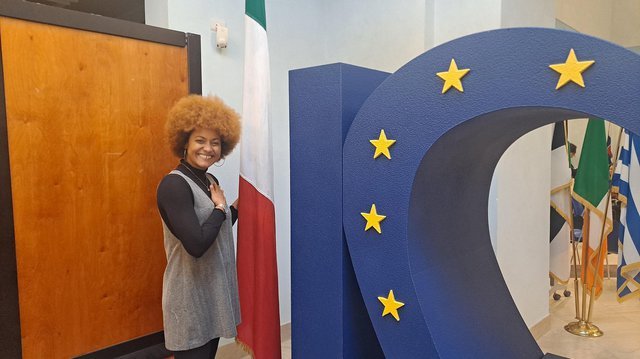This is the story of a Malian woman, who, after escaping violence and abuse by her husband, finds support in Italy, where she was assisted to overcome the trauma of an unwanted pregnancy. Cultural mediator Gogbe Romaine Tia shared Marie's story at a UNHCR event in Rome.
Marie, a woman from Mali, was forced into marriage at the age of 12 after having been subjected to infibulations. Subjected to both physical and psychological abuse by her husband, she found herself abandoned.
As a single woman, she was shunned by her conservative community and fled from her village after a rebel attack, enduring further trauma as she was raped during her perilous journey to safety in Italy. There, an NGO named Differenza Donna (Women’s Difference) was able to support the woman to end the unwanted pregnancy caused by rape.
Marie's account was shared by Gogbe Romaine Tia, a cultural mediator from the Ivory Coast, during a conference in Rome on November 15 organized by the UNHCR and its partners to strengthen protection for those fleeing from gender violence.
The importance of female cultural mediators for migrant women
"I come from the Ivory Coast and I have been a cultural mediator for the past 12 years, a wonderful job that allows me to return all the love I received from the part of Italy that welcomed me and to which I am forever grateful," said Tia.
"Marie’s story goes back to over a year and a half ago. For her, as is the case for all migrant women who have suffered violence, it is very important to find a person who not only knows their language but also the cultural context which they come from and can decipher the body’s mannerisms, the silence, and the facial expressions," she explained.

"Those who arrive carry with them an enormous baggage of sufferance which is not only physical but also mental, and Marie was nearly three months pregnant after the violence she had suffered during her escape from Mali, obviously an unwanted pregnancy. No one would take responsibility for the woman’s abortion, so the NGO Differenza Donna took action thanks to a wide network and with the support of legal services, pushed to have Marie’s right to have an abortion in a safe way," explained the cultural mediator.
Today, Marie has obtained international protection and reunited with her children through family reunification procedures. She has taken an Italian language course, she is also receiving training and she has become a reference point for francophone migrants who arrive in Italy, she added.
Violence at home and during the escape from Mali
"The story of Marie is similar to those of many other women who have no rights in their countries of origin. Marie at 12 years old was forced to marry her cousin, 40, who turned out to be violent. Once he deserted her escaping at that point Marie suffered the stigma of a single woman with children, a very dishonorable status," explained Tia.
The conservative Malian society blamed Marie for her husband's disappearance, exacerbating her hardships. Her escape from rebels led to new abuses and an unwanted pregnancy.
"According to the conservative Malian society in fact, if the husband went missing, the fault was considered to be of the wife, Marie’s own father insulted her saying she had to make her husband return. Then there was the attack by the rebels, the escape, and new abuses that resulted in her pregnancy." Despite the challenges, Marie emerged as a resilient fighter, now actively contributing to Differenza Donna and making a positive impact on her community.
No recognition for those who take in people fleeing
The cultural mediator highlighted the lack of professional recognition and a guild for cultural mediators, given the growing number of arrivals. "This condition creates a great deal of frustration and determines the fact that many women walk away, who do not feel recognized also from an economic point of view. It is a shame because we are talking about people who have a lot to offer, but unfortunately, cultural mediation is not sufficient to live on and it does not guarantee stable employment," explained Tia.
Despite safeguarding the rights of others, cultural mediators often find their own rights overlooked, creating a poignant contradiction. Tia called for proper recognition and economic support for this vital role, emphasizing the valuable contributions cultural mediators can make to society.
Author: Valentina Maresca
